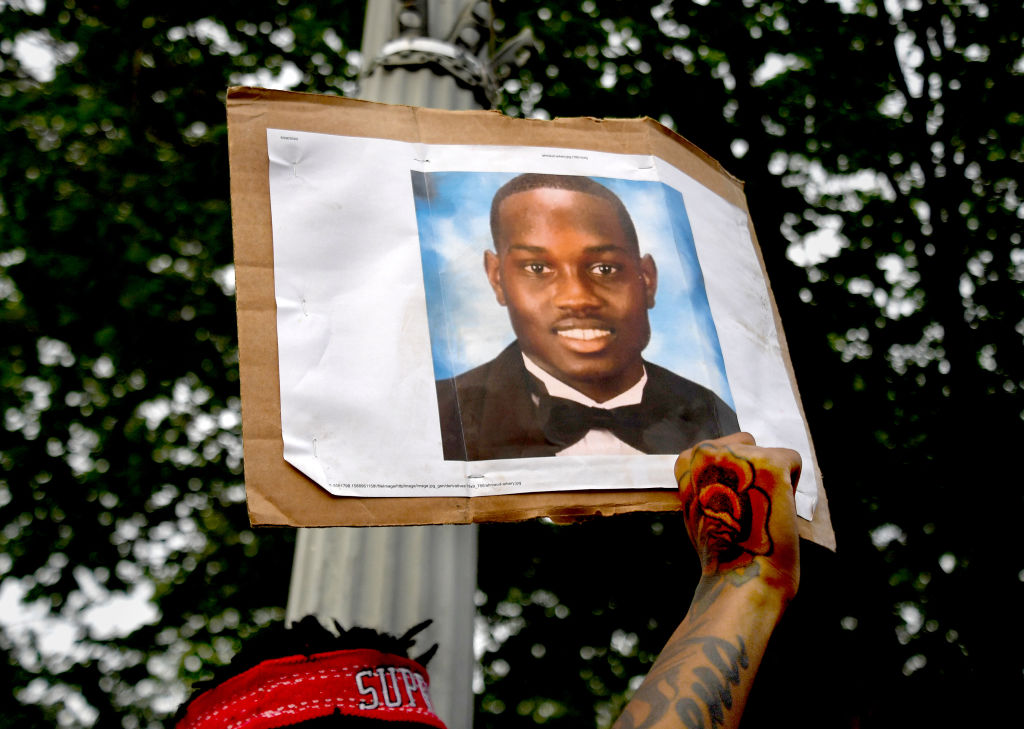Support justice-driven, accurate and transparent news — make a quick donation to Truthout today!
Lawyers for two men charged with the killing of Ahmaud Arbery last year are seeking to restrict ways that he can be described by prosecutors during the upcoming trial, including using words to describe him as the victim of a crime and disallowing photographs of Arbery with family members.
Travis McMichael shot and killed Arbery as the latter was out for a jog near Brunswick, Georgia, in February 2020. His father, Gregory McMichael, who had driven the vehicle with Travis while the two pursued Arbery for several blocks, had initially told law enforcement that Arbery had “violently” attacked his son, resulting in what he had described as a self-defense shooting.
The two said they had pursued Arbery because they believed he matched the description of someone who was entering homes in the area.
But footage from that day’s events, which was released several months after Arbery was killed, shows that both McMichaels, who are white, had taken actions that threatened Arbery, who is Black. The two drove their vehicle for several minutes, guns in hand, pursuing Arbery, the video showed.
When Travis McMichael exited the vehicle and confronted Arbery with a shotgun, Arbery attempted to grab the weapon from McMichael, who then shot Arbery three times.
With the trial for the two McMichaels and their friend William Bryan — who was also involved in the chase that led to the killing of Arbery — set to begin in October, defense lawyers are doing everything they can to downplay the significance of Arbery’s life in the eyes of the jury, reported The Daily Beast’s Kali Holloway.
A motion was filed in late 2020, for example, requesting that the judge only allow one photo of Arbery “when living” to be shown during the trial. The picture cannot show him with family members or other loved ones, per the defense’s request.
That same motion also asked the judge to disallow any family member to be the one to identify Arbery during the trial.
A separate motion from defense lawyers for the McMichaels seeks to bar prosecutors from referring to Arbery as a “victim” in the case, in spite of him being pursued, shot and killed. Doing so would be “loaded” language, the defense team complained, which would wrongly purport guilt on the part of their clients.
Those motions, and several others like them, were filed in order to avoid “the danger of unfair prejudice” among jurors, the defense lawyers said.
The defense team’s motions are an attempt “to prevent a jury from seeing the human life his killers snuffed out that day,” wrote Holloway. Lawyers for the McMichaels are “working to portray a young man who was jogging near his home as a dangerous Black threat whose death was warranted and even necessary.”
Several other examples abound of how the defense lawyers have tried to limit the ways in which their clients can be prosecuted.
Last month, the defense team requested that the judge ask potential jury members to answer a questionnaire before being interviewed individually by lawyers from both sides. That questionnaire would ask jurors about their views on a number of topics, including whether Black Americans and other minorities are treated unfairly in the U.S. criminal justice system, whether “white people who use force against Black people are less likely to be prosecuted than Black people who use force against white people,” and which of three options — “Black Lives Matter,” “Blue Lives Matter,” or “All Lives Matter” — they are most likely to align with (Gregory McMichaels is a retired police officer).
In the same filing last month, defense lawyers requested that the judge bar the press from being in the courtroom during the jury selection process — an ask that contradicts rulings and precedents set by both the Georgia and the United States Supreme Courts.
The trial is set to begin on October 18. The McMichaels and Bryan each face nine charges for their role in Arbery’s killing: four counts of felony murder; two counts of aggravated assault; one count of malice murder; one count of false imprisonment; and one count of criminal intent to commit false imprisonment.
Media that fights fascism
Truthout is funded almost entirely by readers — that’s why we can speak truth to power and cut against the mainstream narrative. But independent journalists at Truthout face mounting political repression under Trump.
We rely on your support to survive McCarthyist censorship. Please make a tax-deductible one-time or monthly donation.
